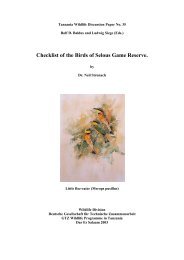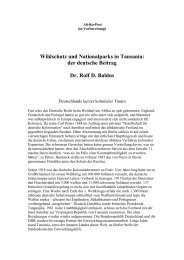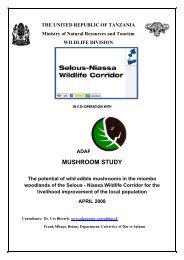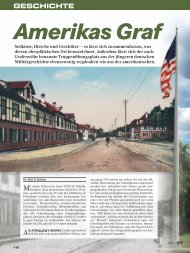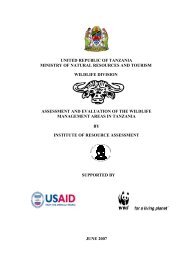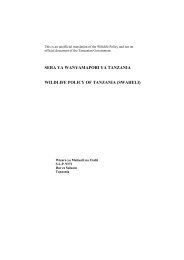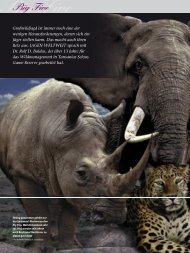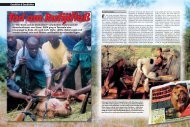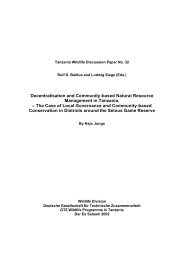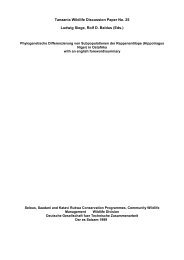African Indaba Articles - wildlife-baldus.com
African Indaba Articles - wildlife-baldus.com
African Indaba Articles - wildlife-baldus.com
You also want an ePaper? Increase the reach of your titles
YUMPU automatically turns print PDFs into web optimized ePapers that Google loves.
<strong>wildlife</strong> on their own," said Dr. Kojwang. "This is just an indicator of what has happened in one particulararea."In Botswana, the Kenyan delegation met with <strong>com</strong>munities in the Chobe Enclave and also visitedNamibian CBNRM projects in Mayuni Conservancy and Zimbabwe's Hwange CAMPFIRE Community. Dr.Rutina, a senior officer for Botswana's Department of Parks and Wildlife Management, explained to theKenyan delegation how Botswana, along with other Southern <strong>African</strong> countries were facing challenges tomanage an overabundant elephant population. "The <strong>wildlife</strong> biomass is increasing," said Dr. Rutina. "Theelephant is transforming the vegetation and that transformation is affecting many species. That's why wehave some of the species populations going down, like herbivore grazers in the Chobe River."Pelonomi Venson, Botswana's Minister of Environment and Tourism, said she was convinced that theKenyans' visit to Southern Africa would help promote sustainable use of <strong>wildlife</strong> in Africa. "It's going to be agreat moment when we next meet with other countries that we can speak on a <strong>com</strong>mon ground on issuesthat we would have had an opportunity to share with you," she said while addressing the Kenyan delegationin Sankuyo, a CBNRM Community in Botswana. After the exchange visits, the West <strong>African</strong> and Kenyandelegations and the Southern <strong>African</strong>s learned that - although their conservation policies and approachesmight have differed - their interests in <strong>wildlife</strong> and natural resources management and the need to alleviatepoverty through promotion of development in rural Africa brought them together.First published by World Resources Institute (Washington, DC), April 28, 2005Editor’s Comment (extract)By Gerhard R DammReaders will remember my article “Hunting in South Africa: Facts, Risks, Opportunities” and thesection, where I broke a lance for strictly controlled and selective hunting inside protected areas. I do notstand alone with this opinion; it has long since been recognized that hunting can offer a vital contribution tothe economics of National Parks without any negative influence on conservation objectives and withoutreducing the <strong>wildlife</strong> viewing pleasure of the general public.Those who disregard this particular option of “incentive-driven-conservation” and the positive effectsit will have on Black Economic Empowerment in <strong>wildlife</strong> management might produce unwel<strong>com</strong>ereactions from quarters they rather don’t want to be allied with.Jon Hutton, Chair, IUCN Sustainable Use Specialist Group, wrote in an article titled ‘Exploitation andConservation: Lessons from Southern Africa’…“that the exploitation of wild species is seen by many industrialized societies as a primitive activity [many]on the margins of the environmental <strong>com</strong>munity consider unnecessary and immoral … their unsophisticatedresponse [is] that markets are bad for conservation. [They] promote preservation – the hands-offmanagement of nature. Hutton speaks in his article about “ecological apartheid and the polarization of thecountryside, where elephants and lions have the right of way in protected areas but give way absolutely toman outside” and he quotes the shortfalls of preservationist strategies as (amongst others)• Making protected areas untenable• Ensuring conflict around protected areas• Making <strong>wildlife</strong> un<strong>com</strong>petitiveMy proposal for strictly controlled hunting in South Africa’s National Parks focused on ways to increasethe value of <strong>wildlife</strong> in the parks system, thus creating an earning potential for substantial amounts of moneyto reduce the operational deficit and to decrease the burden for the taxpaying public. My proposal will createan effective base for real black economic empowerment in <strong>wildlife</strong> management and rural employment andlast not least make real conservation financially sustainable and less dependent from donor funding and thetax payer.54



